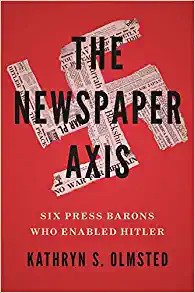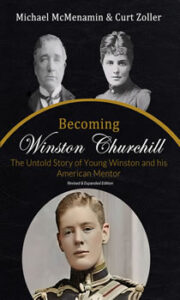
Finest Hour 201
Books, Arts, & Curiosities – The Lords of Ink

September 25, 2024
Finest Hour 201, First Quarter 2023
Page 47
Review by W. Mark Hamilton
W. Mark Hamilton is author of The Nation and the Navy: Methods and Organization of British Navalist Propaganda, 1889–1914 (1986).
Kathryn S. Olmsted, The Newspaper Axis: Six Press Barons Who Enabled Hitler, Yale University Press, 2022, 314 pages, £25.00/$29.40. ISBN 978–0200256420
Kathryn Olmsted of the University of California, Davis has made a significant contribution to our understanding of the Anglo-American news media in the 1930s. Winston Churchill, who at one time had made his living as a journalist and writer, knew all of the “Press Lords” of the era and contributed occasional articles to some of their newspapers. Olmsted examines a half dozen of these publshers: Lords Rothermere and Beaverbrook in Britain, and William Randolph Hearst, Robert McCormick, and Joseph and Eleanor “Cissy” Patterson in the United States.
All of these media moguls promoted a right-wing, conservative domestic agenda and advocated isolationist views in foreign policy. All uniformly opposed US involvement in foreign wars. They objected to President Franklin Roosevelt’s “internationalism” and were sympathetic in varying degrees to Nazi Germany and Adolf Hitler. The press lords held anti-Semitic views, and Olmsted shows that when they could, the press lords worked to undermine a possible Anglo-American alliance against Germany.

2025 International Churchill Conference
Lord Rothermere, who owned the Daily Mail, emerges in the author’s view as the most notorious for his pro-Fascist views. Rothermere told his readers that the Treaty of Versailles was too harsh and unfair to Germany and that it resulted in the rise of Hitler. He wrote to Churchill that the British should use the “language of butter” with Hitler—meaning it was best to placate Hitler to avoid provoking his volatile temper. Not surprisingly, Rothermere had many readers among the Blackshirts, the British Union of Fascists led by Oswald Mosley. To his credit, however, Rothermere did support Churchill’s view on the importance of military aviation and pushed for more expenditure. He feared, as did all the press lords, the rise of Communism.
Olmsted believes that Rothermere’s counterpart in the United States was Hearst, an ardent nationalist and an advocate of “America First.” Though Hearst was immensely wealthy and influential, owning a chain of newspapers and magazines that had as many as twenty million readers a day in the mid-1930s, he was not universally admired. After meeting Hearst in California in 1929, however, Churchill wrote, “I rather liked him and his engaging personality.” Both Churchill and David Lloyd George were hired to write for Hearst newspapers, as were Hitler and Mussolini. Hearst was not the only American press lord to admire German energy and Fascist ideas, but, when traveling in Europe in 1934, Hearst made a point of attending a Mussolini rally in Italy and meeting with Hitler in Berlin.
Robert Rutherford McCormick (the “Colonel”), owner of the Chicago Tribune, earns Olmsted’s nod as the most notorious US publisher. McCormick had a strong hatred for Franklin Roosevelt and considered most liberals and intellectuals to be puppets of Communism. McCormick also nursed an abiding hate for the British and their empire. His pro-Fascism, however, was not so strong as Rothermere’s or Hearst’s. McCormick knew Churchill well, and both had strong personalities—as well as a love of alcohol and conversation that extended well into the night.
For Olmsted, the most editorially balanced publishers in a political sense were the brother-and-sister duo, Joseph and Cissy Patterson. The Pattersons owned the New York Daily News, the first tabloid newspaper in the United States. Both Pattersons tried to meet their readers’ demands for articles on love and sex, money, and murder. Though they initially supported Roosevelt’s “New Deal,” they turned more conservative during Roosevelt’s later years as president. In foreign policy, they did not fear Nazi Germany but did preach against the rise of Japan. As with the other press lords, they held strongly racist views.
One of the first female publishers working in a business dominated by men, Cissy Patterson managed to prosper in a high level executive environment, successfully managing the Washington Times–Herald in the nation’s capital. Her lack of a college degree made her an outlier among publishers, as did her unconventional personal style— Olmsted notes that she swore, drank, and smoked in the office.
Olmsted believes Joseph Patterson was closest in outlook to Max Aitken (Lord Beaverbrook), who also had the strongest personal links to Churchill. In fact, Beaverbrook gave Churchill press writing opportunities and financial support. Beaverbrook and his Daily Express had only one goal—the preservation of the British Empire. The Canadian-born Beaverbrook was not greatly concerned about Fascism or Communism unless they threatened British imperial interests.
Though Beaverbrook supported Neville Chamberlain and his appeasement policy for a period of time, he later turned against Hitler and the Nazis. His eventual service in Churchill’s War Cabinet as Minister of Aircraft Production did not prevent the two men from having heated disagreements.
Ultimately, the press lords described here failed to prevent an Anglo-American alliance, but they continued to support non intervention until there was no choice but to go to war. Olmsted has written a well-researched and interesting book that raises striking parallels to modern press lords. Despite her legitimate castigation of the racist views of the old press lords, however, her strong personal disapproval of their other views could have been more balanced. This also goes for her feelings about Churchill’s conservative politics.
Nevertheless, The Newspaper Axis is well worth reading in order to understand better the forces that influenced the decisions by the British and US governments to enter the Second World War, as well as to parse the parallels to today’s press and newspaper culture.
Subscribe
WANT MORE?
Get the Churchill Bulletin delivered to your inbox once a month.
Oops! We could not locate your form.
Privacy




